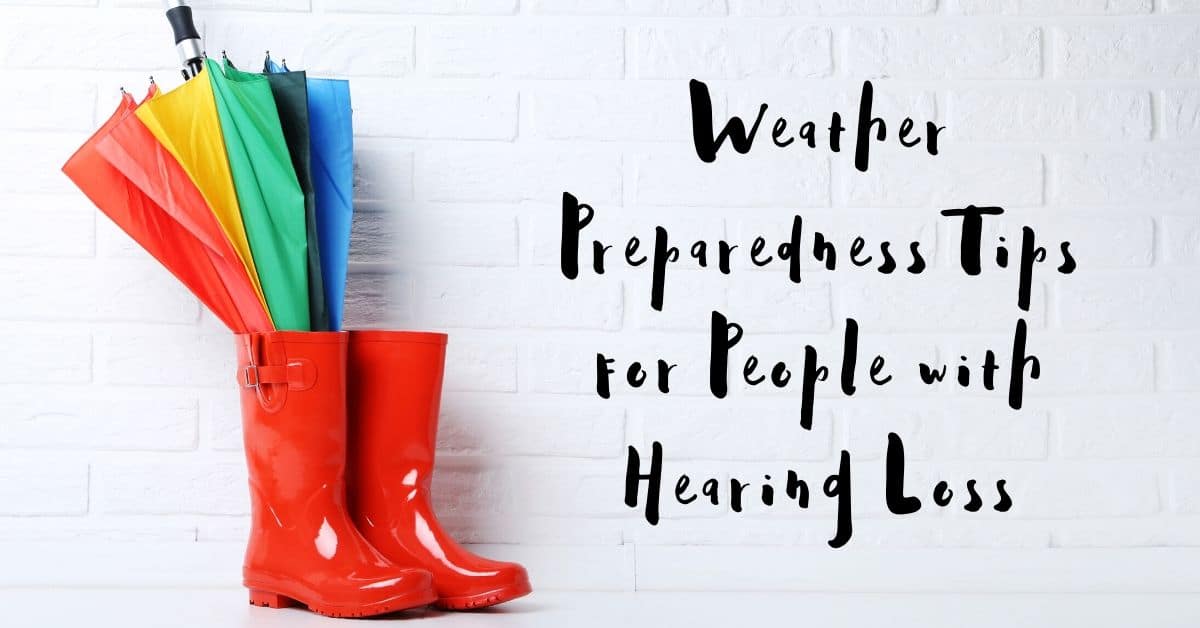
A natural disaster could strike at any time and it is important to be prepared for any emergency that could arise. This is even more relevant for people with hearing loss. The need to plan, practice, and store away information and materials specific for someone with hearing loss could save your life.
The Importance of Visual Alerts
Messages of emergency preparedness and weather awareness are often spread far and wide through radio and television announcements that are then shared through the Internet and social media. Making plans for weather emergencies may be challenging for the deaf and hard-of-hearing community if the information is not presented visually as well as audibly. Weather alert radios and fire safety systems can be modified for people who are hard of hearing to offer vibrations and flashing lights with each message. Smart phones offer a wide variety of visual alerts
The potential problem with live streaming video on social media during weather emergencies is it’s possible that the messages will not be captioned, which creates a barrier for deaf people. Communications that are geared towards mobile apps and smart phones are a necessary part of effective dissemination of emergency and weather information to everyone including deaf and hard-of-hearing individuals. Its important that the information is provided in all modes including auditory, captioning, and sign language.
Pack an Emergency Kit
The basic materials packed in an emergency kit for anyone such as food, first aid, and clothing should remain the same. However, additional items that can help with communication should be included for those who are hard of hearing. It is important to have the following items packed in an accessible location in the home in case of an unexpected emergency.
- Flashlight and batteries for those who need light to read lips.
- Pen and paper in case it is hard to hear and you need to communicate with a first responder.
- Disposable batteries for those with hearing aids or cochlear implants. Keep about 4 weeks of batteries in the emergency kit in case there is no access to purchase or recharge batteries.
- A waterproof container that is large enough to hold hearing aids or cochlear implants to protect if there is no shelter from the weather and elements.
- The phone number of the hearing aid or cochlear implant company in case the device needs to be repaired.
Have a Plan
Keep Your Hearing Aids in a Secure, Easily Accessible Location. There is limited time to act during an emergency. You don’t want to spend time looking for your aids. Keep your hearing aids on your nightstand for easy access when you wake up. A plan is an essential tool for keeping safe, as it establishes what to do in case of emergency.
It could be helpful to reach out to a neighbor you know if there is an emergency so they can help you in an emergency
Devices to alert individuals with hearing loss about potential disasters in their homes?
Fire Safety Alerts: Devices are available that alert an individual with hearing loss to fire or smoke in the house either through a bed shaker or flashing lights. Most devices are compatible with the existing smoke detectors. Everyone should have their emergency alarms regularly tested to ensure they are working properly, but for the hearing impaired, testing is even more crucial. Many alarms beep when their battery is low, but those who have hearing loss may not detect this. Setting up a time every month to check your alarms will help ensure that they work properly if an emergency does happen.
Weather Alert Systems: Weather alert radios are available that tune into National Oceanic and Atmospheric Administration’s (NOAA) 24 hour/7 days a week National Weather Service broadcast. Weather alert radios are particularly designed for individuals with hearing loss that indicate NOAA’s alerts in closed caption messages as well as vibration or flashing lights. You may also be able to receive warnings through email. This can be helpful for individuals who receive emails on their cellular phones.
Preparedness is our way of life
We at Pacific Northwest Audiology care about your safety. For more information on how to prepare for emergencies while living with hearing loss contact us. We are here to help you get through any unexpected emergency that comes your way.
